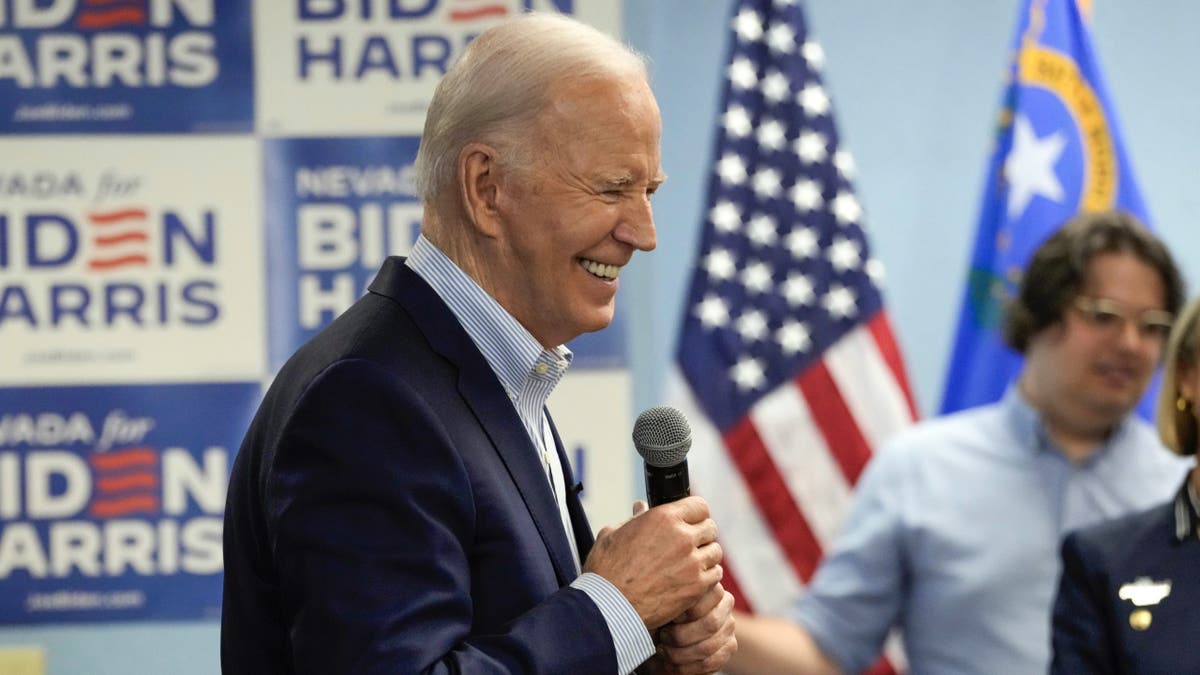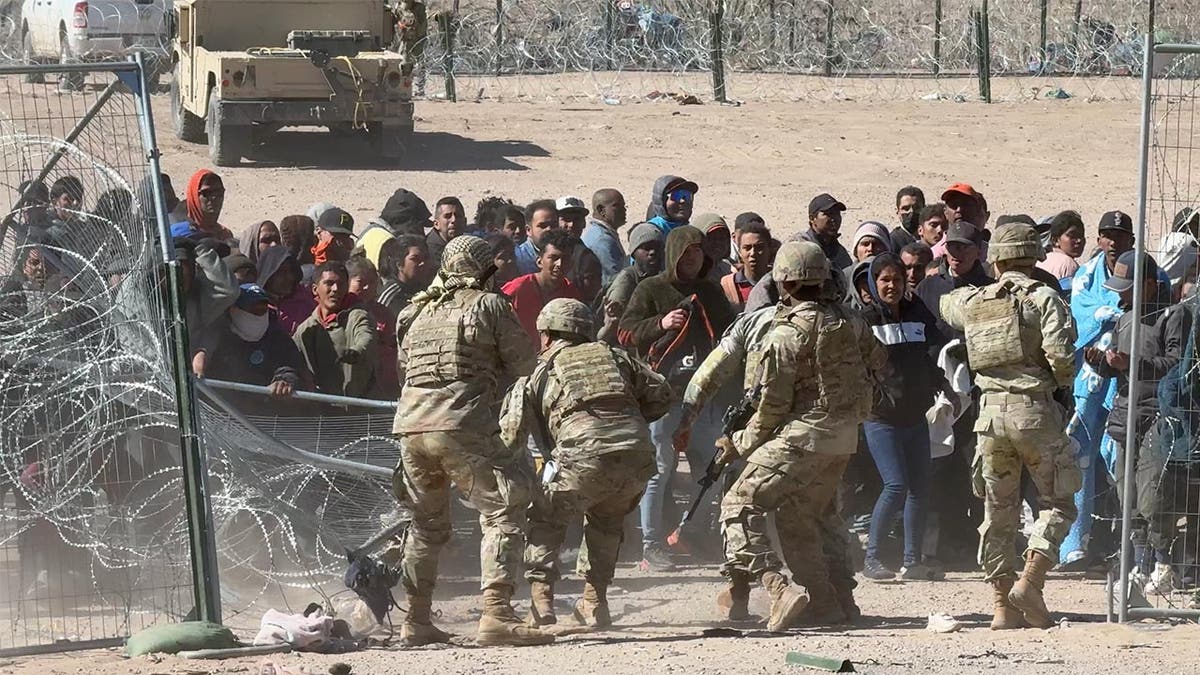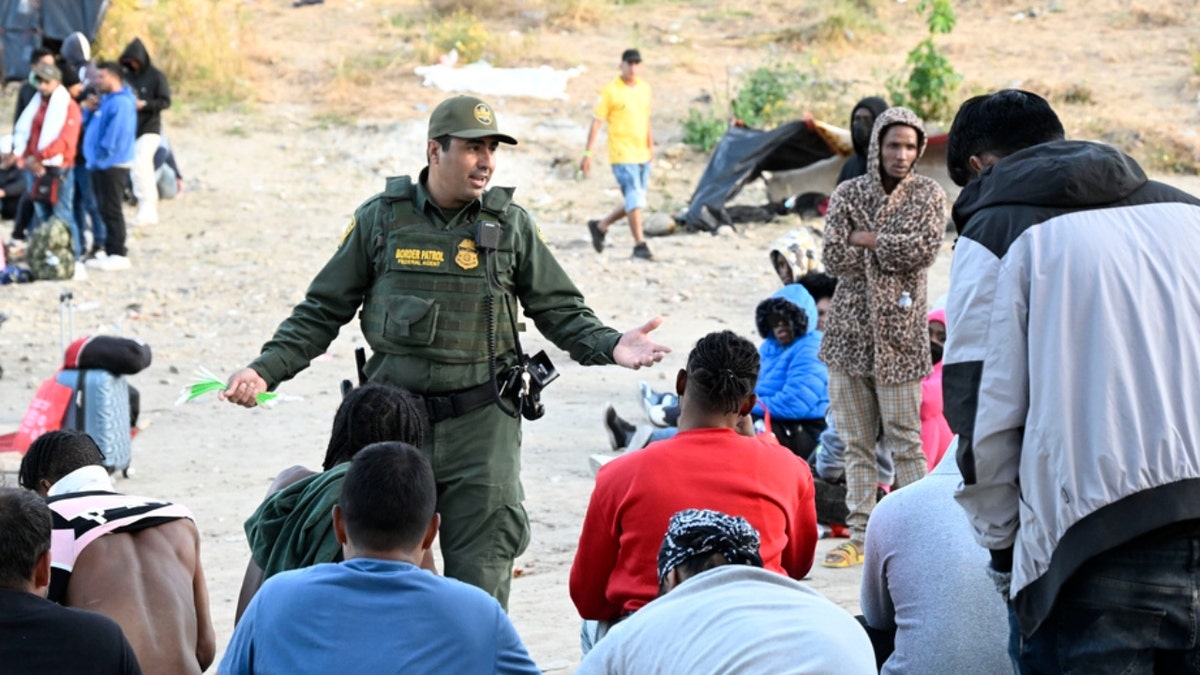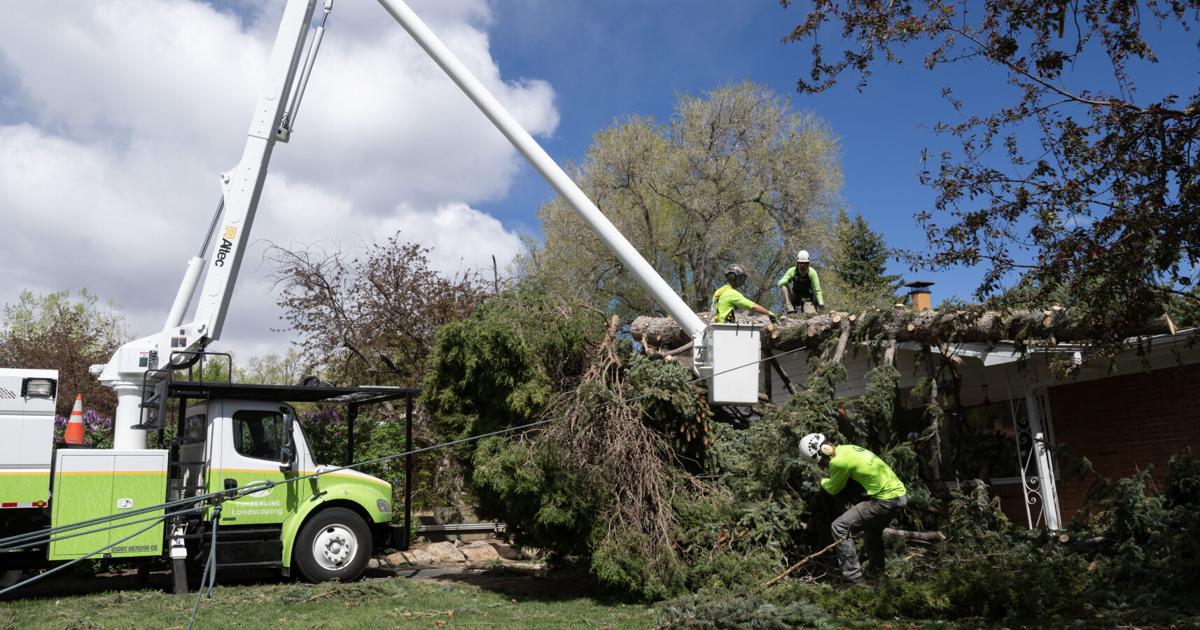Politics
GOP lawmakers demand major donors pull funding from Columbia over 'antisemitic incidents'

FIRST ON FOX: House Republican lawmakers are urging major Columbia University donors who are outraged at the anti-Israel protests on campus to speak out with their wallets.
“As Members of Congress, we urge donors and individuals affiliated with Columbia University to condemn the antisemitic incidents occurring on the university’s campus by pulling donations and support for the university until there are demonstrable changes in leadership, including the resignation of Columbia University President Minouche Shafik,” House Republicans, led by Rep. Eric Burlison, R-Mo., wrote in an open letter to the Ivy League’s vast and influential alumni and donor network.
For days, students at Columbia and its sister school, Barnard College, have camped out on the Upper Manhattan campus while holding demonstrations in protest of Columbia’s investments in companies with ties to Israel. It’s part of a wider progressive backlash against Israel’s response to Hamas’ Oct. 7 terror attacks against the Jewish state.
COLUMBIA UNIVERSITY MOVES TO HYBRID LEARNING ON MAIN CAMPUS AMID ANTISEMITIC PROTESTS
House Republicans, led by Rep. Eric Burlison, R-Mo., inset, are urging Columbia University’s top donors to pull their dollars from the school over its anti-Israel protests. (Getty Images)
But that protest and similar ones cropping up at colleges around the country are now facing bipartisan backlash and accusations of having waded into antisemitic territory.
Social media videos from the anti-Israel tent encampment on Columbia’s campus show activists cheering on the deaths of Israeli soldiers and showing support for Hamas. Jewish students have reported feeling unsafe on campus and shared stories of being verbally and physically assaulted.
“They were pushing and shoving me… They threw rocks at my face. At that moment, my life was totally threatened. And there was no safety authority on campus,” one student told NY1 over the weekend.
COLUMBIA SETS DEADLINE FOR AGREEMENT WITH PROTESTERS, THREATENS ‘ALTERNATIVE OPTIONS’ FOR CLEARING PROTESTERS

Columbia University, where students have set up what is being referred to as a Gaza Solidarity Encampment, is seen in New York on Wednesday. (Getty Images)
In their open letter, the House GOP lawmakers urged donors to follow the example of Robert Kraft, the billionaire owner of the New England Patriots, who pulled his support earlier this week in response to the protests.
“We encourage all supporters of the university to do the same and call for the resignation of President [Minouche] Shafik,” they wrote.
“The university should also provide a thorough review of all school funding and investigate the outside forces influencing students and agitators to participate in these disruptive and violent incidents that target and intimidate Jewish students on campus,” they continued.
“Additionally, we urge all individuals affiliated with the university to call for a transparent and thorough audit of all university funding concerning the anti-Israel movement on campus, and what outside groups are contributing and influencing students and agitators to participate. ”
OMAR’S DAUGHTER DECRIES ‘HYPOCRISY,’ SAYS ANTI-ISRAEL STUDENTS ARE ‘100% TARGETED’ AFTER SUSPENSION AND ARREST

New England Patriots owner Robert Kraft recently announced he would stop his donations over the protests. (Michael Reaves/Getty Images)
It comes a day after Speaker Mike Johnson, R-La., traveled to Columbia with House Education and Workforce Committee Chair Virginia Foxx, R-N.C., and three New York Republicans, where he denounced the protests and reiterated his earlier call for Shafik to resign.
“I’m here today joining my colleagues in calling on President Shafik to resign if she can not immediately bring order to this chaos,” Johnson said as students heckled. “As Speaker of the House, I have committed today that the Congress will not be silent as Jewish students are expected to run for their lives and stay home from their classes hiding in fear.”
Fox News Digital reached out to Columbia University for comment.

Politics
Presidential polls show deadlocked race as party conventions quickly approach

With six months to go until Election Day 2024, the rematch between President Biden and former President Trump is as close as it can get.
The race is tied, according to a new national poll released by USA Today and Suffolk University on Monday.
Biden and Trump each stand at 37% support among registered voters, with Democrat turned independent presidential candidate Robert F. Kennedy Jr. at 8%, and 5% backing other independent or third party candidates.
HAS BIDEN FLATLINED IN THE LATEST POLLS?
A Quinnipiac University poll released in April shows President Biden’s slight lead over former President Trump, right, vanishing. (AP Photo/Alex Brandon / Curtis Means/DailyMail.com via AP, Pool)
“We’re basically at the doorstep of the election, and the outcome is a coin flip,” Suffolk University Political Research Center director David Paleologos said.
The survey is the second in a day to indicate an extremely close contest between the Democratic incumbent in the White House and his Republican predecessor.
CLICK HERE FOR THE LATEST FOX NEWS POLLING IN THE 2024 ELECTION
According to an ABC News/Ipsos poll released Sunday, Trump held a 46%-44% advantage among adults, but Biden has the edge 46%-45% among registered voters and up 49%-45% among those likely to vote in the presidential election.

Republican presidential candidate former President Trump speaks on Tuesday, April 2, 2024, at a rally in Green Bay, Wisconsin. (AP Photo/Mike Roemer)
In a five-way contest that includes Biden, Trump, Kennedy, Green Party candidate Jill Stein and independent Cornel West, Trump has the slight edge among all adults, he is tied with the president among registered voters, and Biden holds the edge among likely voters.
DO THE LATEST POLLS SPELL TROUBLE FOR BIDEN?
The Suffolk poll suggests that nearly a quarter of voters (24%) say they might change their minds ahead of the fall election, with 12% saying they have not made their choice yet in the presidential race.

President Biden speaks at the Washoe Democratic Party Office in Reno, Nevada, on Tuesday, March 19, 2024. (AP Photo/Jacquelyn Martin)
“When we think about the race tied with just 26 weeks to go, we have to consider that people tune out politics and the party conventions in July and August,” Paleologos emphasized. “That leaves just 17 weeks for candidates to actively campaign, and it’s actually 13 or 14 weeks when you consider states where early voting starts weeks before Election Day.”
While national surveys garner plenty of attention, the race for the White House is a battle for the states and their electoral votes, which places a spotlight on battleground state polling.
The most recent polling in the key swing states, including surveys from Fox News, indicate close contests.
Get the latest updates from the 2024 campaign trail, exclusive interviews and more at our Fox News Digital election hub.
Politics
Do the pro-Palestinian protests signal a generational shift in U.S. attitudes about Israel?

The relationship between the United States and Israel has been a tight embrace almost ever since the founding of the Jewish-led state 76 years ago.
Israel has relied on U.S. money, weapons and global diplomatic defense to survive and thrive. Until recently, the support was unflagging from a bipartisan core of Congress and American politicians, and generally from U.S. voters as well.
Formed as a refuge for Holocaust survivors, Israel was often portrayed as a victim and an enduring U.S. ally in a tough and dangerous part of the world.
Israel’s seven-month-old war against the Hamas militant group in the Gaza Strip is testing that relationship.
Reacting to tens of thousands of civilian Palestinian deaths, young Americans are protesting at numerous college campuses across the country. While there have been pro-Israel demonstrations as well, the largest and loudest have been in support of Palestinians.
Here’s a closer look at what the protests might mean for the U.S.-Israel relationship, U.S.-Mideast policy and whether the next generation of Americans will chart a different course.
Why are young people suddenly so interested in this issue?
The Palestinian cause — the quest by millions of Palestinians for independence and a sovereign state after massive displacement by the creation of Israel in 1948 — was wholly marginalized during the Trump administration and remained on the back burner as President Biden pursued normalization of Israeli ties with its Arab neighbors.
Then came Oct. 7, 2023. Legions of Hamas militants and allies swarmed from Gaza into southern Israel, killing, torching and taking hostages. Around 1,200 Israelis on several kibbutzim and at a music festival were killed; more than 200 were captured and hauled back to Gaza.
Israel’s retaliation was brutal and massive. More than 34,000 Palestinians, mostly women and children, have been killed in Israeli airstrikes and land attacks. Most of Gaza’s population of 2.3 million has been forced to flee their demolished homes.
This new, horrific chapter in the decades-long Israeli-Palestinian conflict brought the issue back to the fore.
Which side do younger Americans support?
Even before Israel invaded Gaza following the Oct. 7 Hamas rampage, polls showed a significant amount of unfavorable viewpoints on Israel among young Americans.
In a 2022 survey by the Pew Research Center, only 41% of adults under 30 had a favorable view of Israel, with 56% unfavorable.
By contrast, the majority of all age groups above 50 viewed Israel favorably.
A Pew poll in February found that among young Democrats, support for Palestinians was overwhelming: 47% favored Palestinians compared to 7% for Israel. Support also declined slightly among older Americans, to just under the majority, but it did not translate into support for Palestinians.
Why the difference among age groups?
In addition to the unpopularity of Israel’s counterattack in Gaza, the generational divide is impacted by history and perspective.
“There is a generational replacement,” said Ethan Porter, a professor of media, public affairs and political science at George Washington University in Washington.
Where narratives around Israel and Palestine 30 or so years ago were strong on memories of the Holocaust, today’s activists are more inclined to see Israel not as home to survivors of a genocide but as a colonial occupation power perpetuating one.
Nor do younger Americans have first-hand memories of frightening episodes of Palestinian terrorism, such as airplane hijackings in the 1970s and suicide bombs on buses in the late 1990s and early 2000s.
Also, young people — college students in particular — are predisposed to activism on behalf of those seen as oppressed or discriminated against, following the Black Lives Matter and #MeToo movements demanding fairness, justice and civil rights.
Does this mean young U.S. voters care more about the Israeli-Palestinian conflict?
Not necessarily.
Polls suggest the Middle East is not top on the minds of a large number of young Americans.
The Institute of Politics at the Harvard Kennedy School, which has been surveying young voters for more than two decades, found in a poll this year that among 16 topics of importance to voters under 30, the Israel-Gaza war was in next-to-last place.
The top issues in order were inflation, healthcare and housing.
Is Israel losing the PR battle for young Americans?
Maybe.
Israeli governments over the years have invested much effort in what they call their hasbara, or global PR — pushing the Israeli narrative worldwide.
And it was largely successful. This may be the first episode in the long-running Israeli-Palestinian conflict where the Palestinian cause has driven U.S. discourse.
There are many reasons. The sheer scale of Israel’s assault on Gaza, with massive destruction that wiped out entire families, went beyond previous Israeli offensives and quickly overshadowed the Oct. 7 attacks. It is difficult to put positive spin on tens of thousands of dead.
The evolution of social media into an omnipresent visual force has shown the suffering of Gazans to the world relentlessly.
A new generation of Palestinian activists appears far better organized than their predecessors. The Palestinian PR machine was relatively ineffective in the past.
Today Palestinian activists operate busy WhatsApp chats and can flood the zone on par with Israeli hasbara.
“Social media allows people to see lots and lots of material that affirms what they believe,” Porter said. “The accumulative effect is powerful over time.”
Will the protests change U.S. policy?
That’s the big question.
So far, the college demonstrations, while capturing much attention, show no sign of changing U.S. policy toward the Middle East.
President Biden on Thursday, asked directly if he would alter his approach to Israel in response to the campus chaos, gave a single-word response: “No.”
Several attempts in Congress to condition the billions of dollars in aid the U.S. gives Israel have gone nowhere.
Biden has remained staunchly supportive of Israel’s right to self-defense, but he has also tempered his tolerance of Israeli Prime Minister Benjamin Netanyahu and his right-wing government as they consistently rebuff Washington’s efforts to force Israel to minimize civilian casualties in Gaza and allow the entry of more desperately needed food, water, medicine and other humanitarian aid.
It is Netanyahu’s pugnacious presence at the helm of Israel’s government that has also turned off many American voters, including erstwhile supporters of Israel, polls show.
Biden is also confronting a sharp decline in his political support among Arab American voters, especially in swing states like Michigan, which have a large community of descendants from Lebanon and other Arab nations.
Will these passions among younger Americans last?
It is difficult to say whether these sentiments have staying power.
With college semesters coming to a close for summer, it is possible the protests will taper off.
Students evolve into adults with jobs and often become more conservative or mainstream in their politics, as happened with baby boomers.
Another major Palestinian terrorist attack inside Israel, or violent antisemitic attacks in the U.S., could also restore sympathy for Israel.
On the other hand, young people are vowing to take the pro-Palestinian fight to other venues, including the Democratic National Convention scheduled for August in Chicago and the corporate headquarters seen as complicit in financing the Israeli war effort.
Is this an echo of the anti-Vietnam War protests?
Some comparisons have been drawn between today’s wave of protest to the antiwar movement against U.S. military involvement in Vietnam in the 1960s and ’70s, truly a transformation period in U.S. history that began on university campuses and spread throughout the country.
Some of today’s images to evoke images from a generation ago. Occupying academic buildings. Chanting on green university lawns. Scuffles. And getting arrested by cops.
At Columbia University in New York, the same campus building occupied in 1968, Hamilton Hall, was again broken into and seized by activists in recent days.
But Vietnam had a much more direct impact on many more Americans, infused popular culture and dominated national discourse. Tens of thousands of American men and women were dispatched to the jungles of Southeast Asia and killed in combat. A mandatory draft saw that the pain was distributed among families across the country and across society.
“You can see why people are tempted to draw the analogy,” said Bruce Schulman, a history professor at Boston University who specializes in the Vietnam War and other conflicts. “But the differences are all the more striking.”
Namely, among other elements: the acceleration of both the protest and the response.
It was years into the Vietnam War before the antiwar movement gained momentum; the war in Gaza is about to enter its seventh month. Police units to break up campus demonstrations in the Vietnam era were not called until well into the phenomenon, not in the first days.
Furthermore, Schulman said, the medium-term fallout from the massive antiwar demonstrations in the Vietnam era were not at all what protesters sought. At the national level, the Democratic Party fell apart, politics overall became more conservative, Richard Nixon was elected president in 1968, and the war raged on for several more years with some of the bloodiest, deadliest battles to that date.
Politics
House Dems seeking re-election seemingly reverse course, call on Biden to 'bring order to the southern border'

Five vulnerable Democrats who voted against measures to strengthen border security in the past have seemingly changed their tune as they seek re-election to their posts in the lower chamber.
Following President Biden’s signing of a $95 billion package with aid to both Ukraine and Israel last week, five Democrats – Reps. Jared Golden of Maine, Marie Gluesenkamp Perez of Washington, Mary Peltola of Alaska, Vicente Gonzalez of Texas and Don Davis of North Carolina – released a joint statement agreeing with calls for Congress and the president to “act and bring order to the southern border.”
“Beyond defending our allies, we strongly agree with the National Border Patrol Council that Congress and the President must act and bring order to the Southern border,” the lawmakers stated. “That is why we also voted for H.R. 3602 on Saturday, and why we all voted last month for $19.6 billion for Border Patrol so that it could ramp up its efforts to secure the border.”
The comments from the five Democrats – three of whom (Golden, GluesenKamp, and Davis) are engaged in tough re-election battles that have been labeled “toss up” races by the Cook Political Report, and another two (Peltola and Gonzalez) competing in races labeled “lean Democrat” – came after each one of them voted against the Secure the Border Act of 2023.
VULNERABLE HOUSE DEMS DO A U-TURN ON ILLEGAL IMMIGRATION AFTER CALLING CRISIS ‘NON-EXISTENT THREAT’
Five House Democrats – Reps. Jared Golden of Maine, Marie Gluesenkamp Perez of Washington, Mary Peltola of Alaska, Vicente Gonzalez of Texas and Don Davis of North Carolina – released a statement last week agreeing with calls for Congress and President Biden to “act and bring order to the southern border.” (Getty Images)
That bill, which passed in the House, would have expanded the type of crimes that make someone ineligible for asylum, limited the eligibility to those who arrive at ports of entry, mandated a system similar to the E-Verify employment eligibility verification system, and created additional penalties for visa overstay.
In addition to not supporting the Secure the Border Act, the same five Democrats voted on two different occasions against GOP-led efforts to impeach Homeland Security Secretary Alejandro Mayorkas, whom many Republicans have argued is largely responsible for the migrant crisis at the southern border.
Certain Democrats, like Gluesenkamp Perez, who was first elected to Congress in 2022 and co-chairs the Blue Dog Coalition with Golden and Peltola, have made dismissive comments about the border crisis in recent years.
The Washington lawmaker previously faced criticism from Republicans over border-related comments she made in March 2023 during an appearance on Pod Save America, which came prior to the ending of the Title 42 public health order.
“Listen, nobody stays awake at night worrying about the southern border,” she said at the time. “That’s just not… people stay awake at night worrying that their kid is gonna relapse or that, you know, someone’s going to drop out of school or they’re going to lose their house.”
Gluesenkamp Perez was also one of many Democrats who defended Mayorkas amid calls for his impeachment earlier this year, saying it was “frustrating to see” Republicans push for his ouster because “he doesn’t set policy, he implements it.”
Despite her past remarks, Gluesenkamp Perez has been critical of Biden’s handling of the border crisis in recent months, saying in April that she voted in support of H.R. 3602, which provides for criminal penalties for certain conduct that interferes with U.S. border control measures, because “President Biden has failed to end the crisis at our Southern Border.”
“Every country has an obligation to protect its citizens and secure its sovereign borders, and H.R. 3602 focuses on the urgent need to restore operational control of the Southern Border. Unlike the unworkable and un-American immigration proposals pushed by far-right extremists, this bipartisan bill doesn’t create burdensome government mandates that would harm small businesses, agricultural employers, rural communities, and our economy,” she said at the time.
In a statement to Fox News Digital, a member of the congresswoman’s press team insisted that she has “called on the [Biden] Administration her entire time in office to fix the crisis at our Southern Border, and for Congress to do its job to pass meaningful border security legislation.”
BIDEN ADMIN CONDEMNED FOR CONSIDERING PLANS TO ACCEPT PALESTINIAN REFUGEES: ‘A NATION COMMITTING SUICIDE’

Migrants attempt to enter the U.S. illegally by rushing an opening in the border wall on March 21, 2024. (James Breeden for New York Post / Mega)
The spokesperson also touted the Washington lawmaker’s introduction of the “Defending Borders, Defending Democracies Act to restore operational control at the Southern Border by restoring expulsion authority for Border Patrol and requiring the President to reinstate Remain in Mexico,” as well as her support for the End Fentanyl Act.
“Marie continues to urge Congress to get back to work to address the real crisis at our border and end the petty gamesmanship,” the spokesperson said.
Gonzalez is another Democrat who made dismissive remarks prior to the expiration of Title 42, which provided the ability for American officials to bar migrants from entering the country during a health crisis such as the COVID-19 pandemic.
During a July 2023 stop in Edinburgh, Texas, Gonzalez reportedly shot down questions and concern over whether Biden was doing enough to secure the southern border amid an overwhelming influx of illegal immigrants.
“We have seen major improvements along the border.… If you go to the border now, in our region, it’s pretty unremarkable what you see,” Gonzalez said, according to the Rio Grande Guardian. “When they lifted Title 42 and implemented Title 7, which I advocated against… I’ll be the first to admit that I was wrong. What the president did, what Secretary Mayorkas has done, has positively impacted our border and that’s a fact.”
“People could point fingers and say things, but the reality is, undocumented crossings are down by 70%,” he added at the time.
A little more than a week after Gonzalez gave those remarks, the Texas Tribune reported that Border Patrol agents “made more than 130,000 arrests along the Mexico border [in July 2023], preliminary figures show, up from 99,545 in June.”
Gonzalez is one of 154 Democrats who voted this January against the Agent Raul Gonzalez Officer Safety Act, which would have created hefty federal penalties for illegal migrants who evade U.S. Customs and Border Protection (CBP) officers during motor vehicle pursuits. The measure was named after a Border Patrol officer who died in a vehicle crash in Texas last year during a pursuit.

A U.S. Border Patrol agent talks with asylum-seekers along the U.S.-Mexico border near Tijuana, Mexico, on May 8, 2023, in San Diego. (Denis Poroy/AP Newsroom)
Along with Golden and Gluesenkamp Perez, Gonzalez was one of 201 Democrats who voted in July 2023 against the Schools Not Shelters Act, which would have prohibited “the use of the facilities of a public elementary school, a public secondary school, or an institution of higher education to provide shelter for aliens who have not been admitted into the United States, and for other purposes.”
Peltola joined 218 Republicans in voting in favor of that measure at the time, while Davis did not vote.
“I remain dedicated to addressing the border crisis. However, we must not inflict harm on American agriculture in the process,” Davis said in a statement to Fox. “Initially, I had concerns about the e-verify provision in HR-2, but it was removed, allowing me to fully lend my support, along with just four other Democrats, to H.R. 3602, the Bipartisan End the Border Catastrophe Act.”
Asked whether he believes Biden is responsible for the border crisis, Davis said his “votes speak for themselves.”
CBP records show the first six months of fiscal year 2024 had 1,340,801 total encounters, exceeding the first six months of fiscal year 2023, which set a record of 1,226,254 total encounters.
-

 News1 week ago
News1 week agoBoth sides prepare as Florida's six-week abortion ban is set to take effect Wednesday
-

 Politics1 week ago
Politics1 week agoColumbia University’s policy-making senate votes for resolution calling to investigate school’s leadership
-

 Politics1 week ago
Politics1 week agoGOP Rep. Bill Posey won't seek re-election, endorses former Florida Senate President as replacement
-

 World1 week ago
World1 week agoBrussels, my love? MEPs check out of Strasbourg after 5 eventful years
-

 World1 week ago
World1 week agoRussian forces gained partial control of Donetsk's Ocheretyne town
-

 Politics1 week ago
Politics1 week agoHouse Republicans brace for spring legislative sprint with one less GOP vote
-

 World1 week ago
World1 week agoAt least four dead in US after dozens of tornadoes rip through Oklahoma
-

 Politics1 week ago
Politics1 week agoAnti-Trump DA's no-show at debate leaves challenger facing off against empty podium













